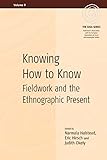Knowing How to Know : Fieldwork and the Ethnographic Present / ed. by Narmala Halstead, Judith Okely, Eric Hirsch.
Material type: TextSeries: EASA Series ; 9Publisher: New York ; Oxford : Berghahn Books, [2008]Copyright date: ©2008Description: 1 online resource (212 p.)Content type:
TextSeries: EASA Series ; 9Publisher: New York ; Oxford : Berghahn Books, [2008]Copyright date: ©2008Description: 1 online resource (212 p.)Content type: - 9781845454777
- 9780857450692
- 305.80072/3 22
- GN346 .K66 2008eb
- online - DeGruyter
| Item type | Current library | Call number | URL | Status | Notes | Barcode | |
|---|---|---|---|---|---|---|---|
 eBook
eBook
|
Biblioteca "Angelicum" Pont. Univ. S.Tommaso d'Aquino Nuvola online | online - DeGruyter (Browse shelf(Opens below)) | Online access | Not for loan (Accesso limitato) | Accesso per gli utenti autorizzati / Access for authorized users | (dgr)9780857450692 |
Frontmatter -- Contents -- Introduction Experiencing the Ethnographic Present: Knowing through ‘Crisis’ -- Chapter 1 Knowing, Not Knowing, Knowing Anew -- Chapter 2 The Transformation of Indigenous Knowledge into Anthropological Knowledge: Whose Knowledge Is It? -- Chapter 3 Knowing without Notes -- Chapter 4 To Know the Dancer: Formations of Fieldwork in the Ballet World -- Chapter 5 Knowledge as Gifts of Self and Other -- Chapter 6 Knowledge from the Body: Fieldwork, Power and the Acquisition of a New Self -- Chapter 7 What is Sacred about that Pile of Stones at Mt Tendong? Serendipity, Complicity and Circumstantial Activism in the Production of Anthropological Knowledge of Sikkim, India -- Chapter 8 Learning to See: World-views, Skilled Visions, Skilled Practice -- Chapter 9 Rescuing Theory from the Nation -- Notes on Contributors -- Index
restricted access online access with authorization star
http://purl.org/coar/access_right/c_16ec
This volume examines some crucial issues in the conduct of fieldwork and ethnography and provides new insights into the problems of constructing anthropological knowledge. How is anthropological knowledge created from fieldwork, whose knowledge is this, who determines what is of significance in any ethnographic context, and how is the fieldsite extended in both time and place? Nine anthropologists examine these problems, drawing on diverse case studies. These range from the dilemmas of the religious refashioning of the ethnographer in contemporary Indonesia to the embodied knowledge of ballet performers, and from ignorance about post-colonial ritual innovations by the anthropologist in highland Papua to the skilled visions of slow food producers in Italy. It is a key text for new fieldworkers as much as for established researchers. The anthropological insights developed here are of interdisciplinary relevance: cultural studies scholars, sociologists and historians will be as interested as anthropologists in this re-evaluation of fieldwork and the project of ethnography.
Mode of access: Internet via World Wide Web.
In English.
Description based on online resource; title from PDF title page (publisher's Web site, viewed 25. Jun 2024)


